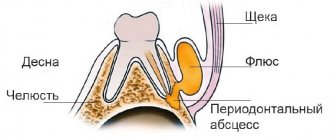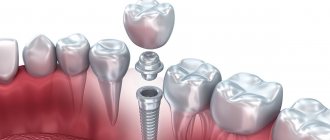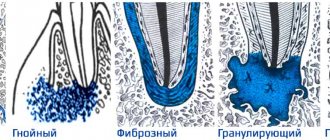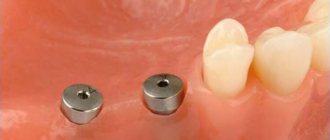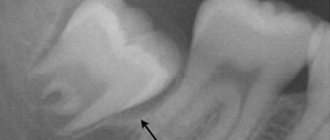Dental implantation is the restoration of lost teeth, based on the introduction of implants into the jaw bone to fix crowns or dentures on them. Implantation is a surgical intervention in which soft tissues, nerve endings, and blood vessels are damaged and unpleasant symptoms appear. Complications occur in 1-2% of patients and appear in the early or late period. You can avoid the consequences by enlisting the support of a conscientious implantologist.
Risks of dental implantation
Just what is happening with the market for implantation offers will cheer up anyone. A huge number of unsubstantiated statements knocks the patient off his feet and the discomfort increases with repeated consultations in other clinics. The surprising thing is that in Russia the price of an implantation service is a measure of the level of quality of the service. There are stories of “no name” implants being placed in VIP clinics with prices starting from 90 thousand rubles for the implant alone. Or stories about replacing the implant specified in the contract with another one.
The patient is not an expert in this field; he trusts his health to the doctor. After reading too much on the Internet, an element of uncertainty and randomness remains in the human mind. Careful reading of the contracts of some clinics sometimes discourages any desire to undergo dental implantation in Moscow.
Patients who are not limited in funds go to Germany or Israel for implantation. This is nice and fashionable, however, the main condition of such foreign treatment packages is not to look back. The aftertaste after such treatment excites the memory of even the strongest and most financially prepared patients. Time, flights, hotels, language barriers, eternal binding to only one clinic and doctor due to refusals to receive detailed statements about previous treatment, a tenfold increase in cost with the same technologies as in Russia. People forget these emotional overloads. For the same reason, you will not find any reviews about dental treatment performed abroad.
Yes, these are not the best times in domestic healthcare and it is better not to get sick here. But in dentistry the situation is the opposite. In Moscow, due to competition, you can find new methods of dental implantation, technological surgery, everything that is possible. However, we must be honest, there are currently no more than twenty specialists in the entire capital. Faculties switched to allocating quotas and places for priority paid training. Every year the enrollment of students “on a paid basis” increases. The results of this interesting solution are already clearly visible in Moscow clinics.
As a result, when searching for “your” doctor, a person faces the following problems:
- Every dentist uses the “best” implant systems.
- Only a few clinics operate with objective data.
- Cost does not determine quality.
- Signing a contract does not always mean using materials that are paid for by the patient.
- The content of the documentation requires “deciphering” by a lawyer.
- It is impossible to verify the honesty of the services.
If a patient ends up in a dishonest clinic, there is a high risk of encountering complications during the intervention process, as well as after it. Some appear after 2-3 years. It is important to find a clinic, as well as an implantologist, that you can completely trust. The safety of the procedure depends on the doctor’s skills and the patient’s willingness to follow the recommendations.
Related articles:
- Our advantages
- Technologies of the Center
- Implant care
How to avoid complications?
“It turns out that implantation is a dangerous operation?” - you ask. This is not entirely true. In modern dentistry, the success rate of this operation is more than 95%. But in order for everything to go well, strict adherence to the basic rules is necessary:
- Choosing a clinic and doctor. This is the main key to success! The clinic must be equipped with all the necessary equipment, and the implantologist must have all the necessary skills to perform the operation. On the clinic’s website or directly at the appointment, you can familiarize yourself with the necessary certificates and licenses. The work of the clinic’s specialists is often written about on the Internet.
Carefully study the guarantees that the clinic provides you. Typically, all details of treatment are described in detail in a voluntary informed consent, which the patient signs before the procedure. The clinic doctor is obliged to discuss with you all questions that you may have
- Preparing for surgery. Proper preparation is the key to success. We have already written about the features of this process in one of the previous articles.
- Compliance with doctor's recommendations. In addition to taking medications prescribed by a doctor, it is necessary to maintain oral hygiene, follow a regimen during the postoperative period, and be attentive to your health.
Complications during implant installation
Installing an implant involves introducing a titanium root into the bone. The classic protocol for the procedure is as follows:
- The doctor makes an incision and carefully peels away the gum to access the bone.
- Creates a hole of the required diameter in the bone tissue and screws in the implant.
- Places a titanium plug on it until the tissue heals completely.
- Places stitches. The tissues grow together in 1-2 weeks.
Bleeding may occur during surgery. The reason may be the inept actions of the implantologist (which is very rare), hypertension or bleeding disorders in a patient who did not warn the doctor about the disease. Moderate bleeding from the intervention area for 2-3 hours is normal. Heavy bleeding for more than 3 hours immediately after the intervention indicates a complication. Minor exudation is possible for up to 7 days.
In our Center, implant installation is safe and completely painless
Painful sensations can be considered a complication during installation. But anesthesia is carried out first, the patient should not feel anything. Increased pain is possible, but the discomfort goes away after an additional dose of anesthetic is administered. The patient should not endure the pain; if it intensifies, the doctor must be informed immediately. We offer implantation in medicated sleep under sedation , when the patient is in a relaxed, comfortable state of half-sleep and does not feel any pain.
Levin Dmitry Valerievich
Chief physician, Ph.D.
What are the dangers of implanting upper teeth?
When implanting teeth in the upper jaw, the bottom of the maxillary sinus is sometimes damaged. The complication occurs due to incorrect determination of the height of the alveolar process or excessive pressure on the instrument. This complication is extremely rare, as a preliminary computed tomography (CT) scan is performed to determine the height of the jaw bone and select the correct implant. If the bone size is not enough to install an implant of the required size, bone tissue augmentation is performed - sinus lift.
Risks when installing lower dental implants
When installing implants on the lower jaw, there is a risk of damage to the mandibular nerve.
Distortion of the vertical dimension of the mandible on an orthopantomogram (OPTG) increases the risk of incorrect determination of implant size. As a result, the walls of the mandibular canal are injured, an intracanal hematoma and nerve entrapment are formed. There is a decrease in the sensitivity of the innervation zone for 2-3 weeks until the blood masses resolve. Therefore, it is important to calculate implant sizes not using OPTG, but using three-dimensional CT.
In patients with osteoporosis, the wall of the alveolar process may be defective or completely absent. Then the nerve is compressed due to hemorrhage into the medullary space and tissue swelling. Partial loss of sensation appears the next day and lasts about a week. If paresthesia continues, the implant must be removed and therapy performed.
Causes of toothache under a crown
- The main cause of toothache is considered to be improper implementation of a set of measures in preparation for prosthetics. During the preparation process, the dentist must remove the nerve near the root of the tooth and fill it. If the work is neglected, cases arise when the canal is not completely sealed. And even in the absence of nerve fibers, the pain remains. This often happens due to strongly curved roots.
- The second reason may be poor quality filling material. When subsidence occurs, the channel may become exposed, or cracks may occur. In this case, caries develops.
- Third, root canal perforation can also cause pain. When drilling a canal with a curved root, sometimes through drilling occurs. As a result, the infection enters from below, developing caries. Also, problems may arise when installing the pin, and the fit may not be sufficient. Again, infection occurs, etc. When drilling or expanding the canal, the dental device may break. As a result, it may remain inside. And then either the tooth is removed or filled with a foreign body.
Let's take a closer look at the causes of pain.
Complications in the postoperative period
The consequences of dental implantation are observed in almost all patients. This is the result of inevitable tissue damage and the introduction of a foreign body into them. Based on the brightness of the reactions, one can judge the implantation of the implants or the development of complications.
| Symptom | Norm | Complication |
| Jaw pain | Appear after the anesthesia wears off. Gradually weaken, disappear within a week | Intensifies every day and is not relieved by analgesics |
| Bleeding | Moderate bleeding 2-3 hours after the intervention | Heavy bleeding longer than 3 hours after surgery or several days later |
| Edema | Appear on day 2-3, swelling is moderate, painless, goes away within a week | The face or cheek becomes very swollen, the swelling increases, and acute pain occurs when pressed. |
| Temperature increase | The temperature goes away in 2 days, the readings are not higher than 38, the general condition is normal | Indicators above 38, lasts longer than 3 days, additional weakness, drowsiness, loss of appetite |
| Difficulty opening your mouth | Caused by swelling and goes away in 2-3 days | Longer than a week, pain and bleeding occurs |
| Hemorrhages and hematomas | Minimum | Extensive, painful |
| Loss of sensation | Goes away soon after installation and activation of chewing load | Lasts longer than a month |
| Seam divergence | Scanty discharge | Bleeding |
Is discomfort inevitable after dental prosthetics?
I would really like to be able to immediately forget about all the unpleasant experiences and sensations associated with this visit after visiting the dentist, but discomfort after dental prosthetics is still a very common occurrence.
Why does this happen, is it possible to avoid discomfort and pain, and finally, what are the main reasons for the feeling of noticeable discomfort after the end of prosthetics? Find out more about the benefits of dental prosthetics
Consequences during the period of osseointegration
When implants take 2-4 months to heal, complications sometimes arise in the form of:
- peri-implantitis - inflammation of soft tissues in the surrounding area, which leads to the destruction of bone tissue, accompanied by pain and suppuration;
- implant rejection - consequences of peri-implantitis, inflammation and necrosis of bone tissue extends beyond the area where the titanium root is installed.
Cause of complications:
- violation of the rules of oral hygiene by the patient, smoking;
- body condition - weakness of bone tissue, severe chronic diseases;
- Violation of implant installation technique is very rare in practice.
What should pregnant women do if they experience toothache under a crown?
It's no secret that during pregnancy a severe calcium deficiency occurs in the body. The teeth are the first to suffer from this. With proper nutrition, you can always replenish the calcium supply in a pregnant woman’s body. Alas, not all expectant mothers take care of themselves properly. It is not uncommon for pregnant women to visit the dentist.
If even the slightest toothache occurs, pregnant women are simply obliged to immediately consult a dentist. By the way, they are accepted everywhere out of turn. Know that any inflammation in the oral cavity, not to mention its purulent manifestation, necessarily affects the development of the fetus, and therefore the health of the newborn.
If it is not possible to quickly get to the dentist, pregnant women should at least slow down the further development of dental disease using traditional methods. To do this, you can rinse the mouth with soda, salt, chlorhexidine, chamomile or furatsilin. You can apply a piece of cotton wool soaked in a solution of dental drops to the area of pain. In particularly acute cases, you can take a paracetamol tablet. At the 5th month of pregnancy, you will already be able to withstand pain relief, so during this period, feel free to make an appointment with the dentist.
Problems during the second surgical stage
The second stage of dental implantation involves:
- opening the implant (to do this, the doctor cuts the gum above it);
- removing the plug;
- installation of a gum former.
Due to disorders of bone regeneration, the intraosseous element is twisted, and when implanting teeth in the upper jaw, it is pushed into the maxillary sinus. This complication is prevented at the stage of formation of bone tissue around the implant - during the period of osseointegration, CT is periodically performed to monitor the formation of bone structures.
There are opposite situations when the top of the implant is overgrown with bone tissue. This process is not considered a complication and does not have a special impact on the implantation process. The doctor cuts the periosteum and removes excess with a saw to properly install the healing abutment.
For prosthetics
The final stage of dental implantation involves the installation of dentures. To do this, the doctor:
- removes the gum former;
- installs the abutment (plays the role of an adapter from the intraosseous element to the crown);
- attaches a crown or orthopedic structure created from previously taken impressions of the patient’s jaw.
The orthopedic design must suit the patient taking into account the position of the implants. Errors can result in incomplete adhesion of the prosthetic attachments and abutments, leading to loosening of the implants. Inconsistencies between them lead to incorrect distribution of the load during operation, which also leads to damage to the structure and is fraught with rejection.
The coordinated work of the orthopedist and implantologist during preparation is extremely important.
Pain after poor treatment
Prosthetics is a complex and often lengthy process that requires the efforts of at least 3 professionals (dentist therapist, orthopedic dentist and dental technician). Mistakes by any specialist can lead to pain under the crown.
Poor pulp removal
Before installing a prosthesis, in the vast majority of cases, the tooth must be depulped - the dental “nerve” (pulp) must be removed. Moreover, if there is good access to the cavity at the apex, then the root canals are narrow and deep. And without special training, experience, as well as instruments and devices (files, microscope), it can be difficult to remove all remnants of soft tissue from the canals. And even if the “nerve” is completely removed, antiseptic treatment or pin installation may be carried out incorrectly.
The pain may be caused by mistakes made when removing the nerve.
Any of the above conditions can lead to the growth of a bacterial outbreak inside the tooth under the crown.
Poor quality filling
Illiterate filling manifests itself in various situations. Firstly, the filling composition may escape beyond the root. In this situation, intoxication and periodontal injury will occur. Filling the canal incompletely can also cause consequences in which pain occurs. Incorrect selection of material or violation of technology can lead to the appearance of air cavities in which infection can form. As the filling shrinks, the material sags and ceases to fit tightly to the canal walls. The tightness disappears, the load on the teeth when eating food is unevenly distributed.
Wall perforation
Perforation is the accidental creation of a horizontal hole in the root wall (most often). It also occurs during the passage of channels, namely, their expansion with boron. The defect requires immediate elimination, because if treatment is delayed, the tooth may need to be removed. After all, a small hole can eventually turn into a crack and lead to a root fracture.
Instrument fracture in the canal
Another cause of pain is when a piece of the instrument remains in the canal. For example, this could be the tip of an endodontic file. Many people know that this is a thin needle that the dentist turns in the root canal during the treatment of pulpitis. Such a fragment will press with a sharp edge on the root apex or on the periodontal ligaments.
A piece of instrument left in the canal can also cause the problem.
Errors in the manufacture of orthopedic structures
The prosthesis may not be the right size in the following cases:
- if the impressions are taken incorrectly,
- the impression material is deformed,
- if the model was not tried on during production,
- The dental technician did not make any corrections after trying on the model.
Incorrect crown installation
The prosthesis can be installed higher or lower than normal. In this case, the antagonist teeth will be damaged or the tooth under the crown will be knocked in. In addition, there is a large gap between the installed denture and the gums, in which food debris can become clogged. This can lead to inflammation of the mucous membrane and the occurrence of cervical caries.
If in this case a tooth begins to ache under the crown (“alive” or “without a nerve”) - from cold or hot, from sour or sweet food, then carefully look at your smile in the mirror. It is likely that just such a gap of open natural enamel will be discovered in the gingival zone.
After the preliminary procedures, it is worth taking an x-ray, in which you can see both drilling defects and foreign bodies.
During operation
Late complications occur 6 months or more after implantation. Causes:
- violation by the patient of the rules of oral care;
- exacerbation of chronic diseases;
- errors by the implantologist in selecting the implantation protocol, violation of prosthetic technique;
- installation of low-quality implants;
- hormonal changes in women in the first six months after installation of implants (menopause, pregnancy).
The most common complications:
- Mucositis - manifests itself as redness, cyanosis or bleeding of the gums in the area where the intraosseous element is installed.
- Peri-implantitis is characterized by inflammation along the border between the implant and bone tissue, resorption (destruction) of the latter.
- Sinusitis - may be of rhinogenic origin, then the area of the artificial root becomes a secondary focus of infection.
- Inflammation of the maxillary sinus can develop against the background of peri-implantitis.
- Damage to the orthopedic structure - when chewing, loads regularly occur on the dentures and the implants themselves.
Similar articles:
- Guarantees of our Center
- Reasons for rejection
- Engraftment of implants
What contraindications to implantation can lead to possible complications?
Restrictions can be absolute or relative. The first ones say that implantation is impossible. Ignoring will lead to complications for the patient. Absolute contraindications include:
- chronic diseases in the stage of decompensation;
- serious bleeding disorders;
- mental disorders.
With relative restrictions, implantation is carried out after treatment and improvement of the patient’s condition. These include:
- ARVI;
- chronic infections;
- suffered a heart attack or stroke;
- period of pregnancy and breastfeeding;
- risk of bacteremia (against the background of rheumatism, endocarditis, as well as in patients with prosthetic heart valves);
- exacerbation of chronic diseases;
- drug treatment that reduces the regenerative capacity of tissues.
What to do to prevent the installation of implants from causing harm
To avoid complications during dental implantation, you need to cooperate with the implantologist and strictly adhere to the recommendations. It is important to familiarize yourself with some of the nuances of the procedure in order to recognize the danger.
Follow your doctor's recommendations
Expert advice is aimed at speeding up the implant healing process. But the main task is to protect a person from complications. Recommendations from experts that must be followed strictly:
- Take prescribed medications (strictly on time, in the indicated doses, for the prescribed period).
- Irrigate the oral cavity with antiseptic solutions (do this regularly for the required period to prevent tissue infection).
- Monitor (by the visual condition of the gums or the patient’s own feelings) the process of implant integration, consult a doctor if alarming symptoms occur.
- Care for the oral cavity according to the prescribed scheme (do not skip hygiene treatments, do it conscientiously).
- Quit smoking for at least 2 weeks before and after surgery (bad habit slows down healing).
Choose quality implants
Cheap artificial roots have not undergone sufficient clinical testing, and it is impossible to predict safety and stability during use. The surface of the material may contain tiny foreign particles that interfere with osseointegration, which increases the risk of complications.
In our Center for dental implantation, implants from Nobel Biocare are used, which were developed based on the results of clinical research
over 50 years.
Nobel Biocare advantages:
- Survival rate 99,3%.
- The microstructure of the TI-Unite implant surface imitates root dentin; the artificial root takes root within 2 weeks .
- Protection against counterfeiting thanks to proprietary numbering of Nobel Biocare implants.
- Lifetime warranty.
Find out the cost
The price of implantation includes the cost of materials, preparation and operation of expensive equipment, and the services of several specialists on whom the result depends. Taking into account acceptable costs, dental implantation cannot cost 10-20 thousand rubles.
Prevention
After implantation surgery, your doctor will prescribe you certain medications that will help minimize the possibility of these complications occurring. The main thing is to follow the doctor’s recommendations, carefully examine the surgical area, try to avoid solid foods (crackers, nuts), and monitor oral hygiene (carefully brush your teeth, rinse your mouth after eating). If something worries you, you should definitely contact a specialist, and not self-medicate or search for answers on the Internet. Doctors at the Golden Section clinic are always ready to answer all your questions.
Prices in our Center are natural and final
The cost of the surgical stage of installing the Nobel implant is from 60,000 rubles. Includes the cost of the implant, its installation, anesthesia, bone reconstruction, installation of formers, as well as pre- and post-operative examinations.
Levin Dmitry Valerievich
Chief physician, Ph.D.
Contact experienced doctors
The level of qualification of a specialist is indicated by:
- practical experience working with implants;
- portfolio of work and client reviews;
- evidence of regular completion of advanced training courses;
- reputation and popularity of the clinic.
Our Center employs highly qualified doctors and employees of Moscow universities. They undergo internships in the USA and Germany and regularly take advanced training courses. Our implantologists know the nuances of all time-tested implantation protocols and the latest innovations. We will try to help and not disappoint you.
Question answer:
I don’t have enough bone tissue, they suggested basal implantation. What complications are possible?
Basal implantation is a branch of surgical dentistry, which involves restoring the dentition without replenishing bone tissue deficiency. Implants are installed even if there is a lack of cancellous bone. This reduces the number of necessary surgical procedures and shortens the treatment time, but the method is not confirmed by positive results of long-term data and has many disadvantages: traumatism - elongated titanium rods are used, which are installed in the deep layers of the jaw bone; difficult rehabilitation - long, accompanied by swelling and pain; used when 3 or more teeth are lost - implants are installed at an angle and can damage the roots of adjacent teeth; the service life of implants has not been confirmed; the 2-year rejection rate is about 40%; rejection occurs with exfoliation of bone tissue; low aesthetic result - it is impossible to make dentures that look like natural teeth; limits the possibilities of prosthetics using other methods.
Levin Dmitry Valerievich
Maxillofacial surgeon, chief physician of the Center
Treatment of a tooth under a crown
Dental treatment in this case can be divided into two cases: pain in a “living” tooth and a “dead” tooth.
For the first option, the crown is removed, the damaged tissue is drilled out, filled and a column is installed. The inconvenience in this case is that you have to spend money on a new prosthesis, since the old one was damaged during removal. But technology does not stand still, and now you can cure a tooth without removing a prosthesis or crown. To do this, a hole is drilled on the chewing side of the tooth, the excess is removed, and the tooth is filled along with the open part of the crown.
For a tooth with a removed nerve, there are two cases: with a pin and without a pin. In the first case, everything happens as in a living specimen: removal of the crown, drilling, filling, new column. For the option with a pin, you will have to resort to surgery. An incision is made in the gum, through which the inflamed and damaged tissue is removed.
